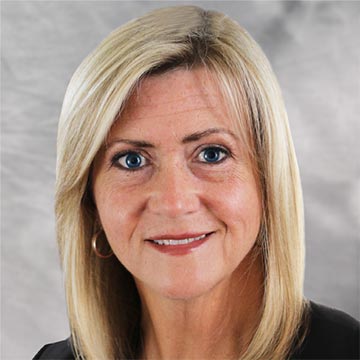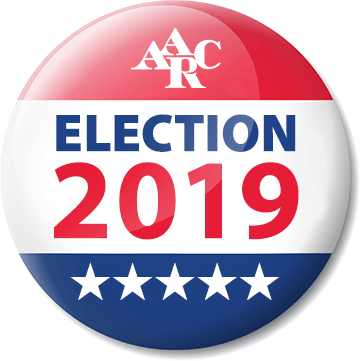Vice President – Internal
Lisa Trujillo, DHSc, RRT
University of Kansas Medical Center
Program Director/Associate Professor
Department of Respiratory Care and Diagnostic Sciences
Member Since: 2003
AARC Activities:
- Director at Large, 2015-2017, 2017-present
- Chair, Strategic Objective #2 Committee
- Board Liaison, Simulation Roundtable, 2015-2016
- Chair, International Medical Mission Roundtable, 2010-2014
- Co-Chair, International Medical Mission Roundtable, 2015-2016
- International Fellow Host City, 2012, 2013, 2015, 2017
HOD Activities:
- Delegate, Utah Society for Respiratory Care, 2013-2014
Affiliate Activities:
- President-Elect, Utah Society for Respiratory Care (USRC), 2008
- President, 2009
- Past-President, 2010
- Board of Directors, 2005-2007, 2011-2013
- Delegate, 2013-2014
- Co-Chair, Program Committee, 2013-2017
Related Organizations:
- International Outreach Committee Chair, Coalition on Baccalaureate and Graduate Respiratory Therapy Education (CoBGRTE), 2012-present
- Training Center Coordinator, American Heart Association, 2011-2014
- ACLS, PALS, BLS, Instructor-Trainer, 2009-present
- Neonatal Pediatric Program Instructor/Trainer, American Academy of Pediatrics, 2005-present
- Charity Beyond Borders Founder/President (a non-profit organization providing medical and educational services in Ghana), 2006-present
Education:
- DHSc (Emphasis: Global Health), Nova Southeastern, Fort Lauderdale, 2013
- MSRT, Northeastern University, Boston, 2009
- BS, Weber State University, Ogden, 2000
- AS, Weber State University, Ogden, 1999, RRT
- AAS, Weber State University, Ogden, 1998, CRT
Publications:
- Comprehensive Perinatal and Pediatric Respiratory Care, author, (2014)
- Principles of Pharmacology for Respiratory Care, contributor, (2014)
- Clinical Applications of Mechanical Ventilation, contributor, 2013
- The interest of Utah respiratory therapists and respiratory therapy students in pursuing an online master of respiratory therapy degree, author, 2013
Elections Committee Questions:
What AARC or Chartered Affiliate offices/positions have you held where you feel you made a significant contribution to our profession? What is the contribution and how will you apply it to your new position, if elected?
I have served in the Utah Society for Respiratory Care (USRC) in the offices of Director, President, and Delegate, and have participated on a variety of committees. I have also participated in local legislation, budgeting and conference planning, membership initiatives and management seminar development. I led the initiative to develop an International Medical Mission Roundtable within the AARC where members can come together, exchange ideas, collaborate and support medical mission work. I currently serve as a Director at Large on the AARC Board of Directors, where I am the chair of the Strategic Objective #2 committee. Each of these offices/positions has helped me develop leadership skills that I can readily apply to this position. I feel that my experience liaising with national and international agencies, associations and organizations will help me professionally and diplomatically work with external agencies, associations and organizations that the AARC collaborates with.
What experience would you bring to the AARC to accomplish the goals set out by President Walsh?
Through my experience as a respiratory therapist, an educator and an advocate for our profession in local, state, national and international arenas, I have developed skills that enable me to diplomatically and effectively communicate with diverse groups in order to reach common goals. I have also worked diligently as an AARC Director at Large during my term to impact the educational expectations of our profession and to support initiatives brought before the board that serve our membership and our patients. I strive to engage in healthy collaborations, extend professional courtesy, support cooperative research and encourage stimulating creativity among my AARC relationships. This is key to achieving the goals set forth by President Brian Walsh of quality care, patient safety and exceptional value. Focusing my efforts on these goals will allow me to represent the membership and support initiatives that benefit our patients, their families, the public, and the profession.
What ideas do you have to attract non-members to join the AARC?
Through my involvement at the state level and national level, I have had many conversations that revolve around increasing membership. Unfortunately, apathy and lack of understanding the importance of membership seem to be common themes. I feel our greatest strength in increasing membership is through the involvement of students in state affiliate and national opportunities. If engaged early, students and new graduates will grasp the importance of being involved in their professional society. This type of grassroots emphasis will capture the invaluable enthusiasm that students and new graduates have for the profession and will result in greater retention of membership in this population. One example is the student mentorship opportunity available through the House of Delegates. This has been highly successful in Utah. We have observed first-hand the impact engaged students have on the profession and membership.
Role-Specific Questions:
How would you, as a member of the AARC Executive Committee, work to move the profession forward based on the work done by our current and previous presidents?
As a member of the Board of Directors, I will have the unique opportunity to serve in leading organization for respiratory care throughout the world. My role is to carefully review all initiatives brought to the board for consideration, keep the patient in mind with all decisions and to represent the membership of the organization. My role is to share creative and innovative ideas as I participate in committee appointments and other board activities that help shape the future of the profession. As research, technology and advanced therapies continue to drive our profession, educational advancement is also necessary. In order to ensure that future respiratory therapists are prepared to move into the workforce, entry level into the workplace at a bachelor’s degree level is essential. To accomplish this, it is vital that we also encourage respiratory therapists to pursue graduate degrees in order to serve as educators.







